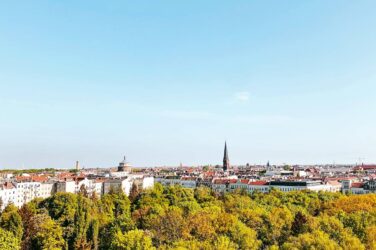Is your mailbox full of polite negative answers to your job applications? Tired of writing down unmotivated motivation letters? Maybe founding your own company could be a good way of fooling the damn crisis! E&M interviewed Sandra Thoms, a young French-German entrepreneur who was very sure about one thing: The 2500 publishing companies based in Germany weren’t enough, there was a market for her baby, the Dryas Verlag…
This publishing company, founded in 2006, publishes very special travel guides in her two collections, Goldfinch Books, which focuses on Great Britain, and Dryas’ Abenteuer Alltag – adventures of everyday life – in which someone who lived for a long time in another country writes about his or her everyday life and the differences between European and foreign cultures. Continue reading to find out more about Sandra’s publishing adventure…
 Sandra Thoms
Sandra Thoms
was born in 1976 in Basel (Switzerland) and is half French, half German. She studied translation as well as cultural management and lives now in Oldenburg, Germany. Sandra Thoms gained working experience in the IT domain as well as in journalism and finally founded her own publishing house, called dryas in 2007. Since 2010, dryas has fusioned with another small publishing house called Goldfinch which specialises in travel guides to Great Britain.
E&M: When you decided to start your own business, why did you choose a publishing company?
I was working for a big publishing company specialising in academic literature and what you could do there was very limited; I wanted to focus on interculturality as a subject but I didn’t have the opportunity of putting my own ideas into practice, so one day I quit and did my own thing.
E&M: And that’s why you chose to focus on travel guides?
I love travelling and I always had a very big collection of travel guides. Unfortunately most travel guides only collect hotel addresses. I had the idea of creating travel guides which would take a closer look at the travel destinations, at the everyday culture and the people living there. Travelling broadens your horizons and you discover that not only the European way of understanding things is the correct one, the way other peoples, other cultures see the world can be right as well.
E&M: What makes a 30-year-old start her own business? Did you have previous experiences before?
That’s the best age to become a self-employed person, I think, because you already have some experience as an employee in your field but you aren’t yet too afraid or too settled down to try something new. I learned by doing and I had to learn a lot, but it was worth the effort.
30 is the best age to become a self-employed person, I think, because you already have some experience as an employee but you aren’t yet too afraid to try something new.
E&M: Do you think that entrepreneurship is a gift you are born with? Can entrepreneurship be learned/nurtured?
I’m convinced that it can be learned. I know a lot of different entrepreneurs and most of them have nothing in common. I don’t think they have a common gift from birth. I think you have what you need to be an entrepreneur if you are willing to learn and you like to try new things. In addition, it is helpful to have entrepreneurs in your family or circle of friends so you can get advice from them. But this was not the case for me, so I think it is possible to get the information you need nevertheless.
E&M: Did you get any help – training, funds, advice… – from any public authority when starting your business? If yes, which one? How would you assess their input?
Yes, I got help from the founders office of the women’s representative of the city of Mannheim. They were very helpful because at the beginning there are lots of different things to do and you have to set clear priorities. I knew how to publish a book but not how to run a company: issues like taxes, relationships with banks, how to write a good business plan and so on… Luckily my first office was in the same building as the chamber’s, so I always got a prompt reply to my questions!
E&M: Would you call Dryas Verlag a European company?
Although the company is based in Germany, we do see ourselves a as a European company. Seven of us work here and all of us have strong connections to other countries. The problem of publishing companies is that they are restricted by language, so we have a lot of business contacts in Switzerland and Austria because they speak German there.
E&M: When was the worst moment in your business venture – that moment in which you thought you’d better give up?
Every time I looked at my business figures in the first three years. Fortunately, I have an admirable husband and great family and friends who endured every crisis.
E&M: And the most rewarding moment?
The first time I held a book from my own publishing house in my hands. And the first time a newspaper wrote about the books.
E&M: What makes your books different from other well-known and widely-used publishing companies focusing on travel guides? What’s your publishing philosophy?
The details. Our slogan depicts our publishing philosophy: plunge in instead of ticking things off, take your time to discover and be open for new experiences. For this reason we provide extensive, in-depth, first-hand information. We don’t simply tell you where the best tea-time spot in town is, we go there and we interview its owner so that you know more about the origins of the place and why it is so special. The owner speaks to the reader through the interview so you get the impression that a good friend with insider knowledge is recommending the places he or she really likes, that’s why it’s important for us that our authors are locals and not tourists themselves.
E&M: Lonely Planet or Patrick Leigh Fermor. Where would you stand?
Neither – our books are more than a collection of the best and coolest addresses and places to stay; they put you in contact with the people living there. Our suggestions are not only for backpackers but for people who want both to save money and to travel in the most comfortable way. And this is not literature, the books are made to be used, so they are clear and simple to read.
Our slogan depicts our publishing philosophy: plunge in instead of ticking things off, take your time to discover and be open for new experiences.
E&M: Is there a particular book published by you that you particularly like? Why?
This particular book is still on its way – on September the 20th the German translation of the Time Out guide “1000 things to do in London for under £10” will be released. It’s full of hidden (and cheap) London gems that visitors wouldn’t be able to find on their own, especially not on short visits, such as unusual parties in an anti-art school, a very cheap restaurant with a Michelin star, waxworks for free and so on. It’s a special book for me because this is the first book that has been published at Goldfinch since Goldfinch has been part of Dryas.
E&M: Do you receive many unrequested manuscripts from young writers? What you do with these?
Yes we do. We receive lots of manuscripts, about three or four per week. Selecting which ones we are going to publish is a very difficult task, because as it happens, a lot of manuscripts aren’t bad at all but when you have so many, of course you cannot take them all. Therefore, I first focus on the author as it is very important for us that they are real experts on the country or city they are writing about. Then, if this first condition is met I look at the quality of the manuscript. If it’s good I send it to some of my readers and based on their feedback we start a discussion to decide whether to publish it or not.
E&M: Now that you are an experienced publisher of travel guides, what would be the trip of your dreams?
A trip around the world.
E&M: What’s the most important advice you’d give to a backpacker travelling around Europe? (Other than carrying one of your travel guides!)
Just one thing: be open-minded and do not try to find the same things as you have at home. If you want everything to be like it is at home, stay there!
Teaser photo: “lili may” / www.youthmedia.eu, CC-License(by-nc)





